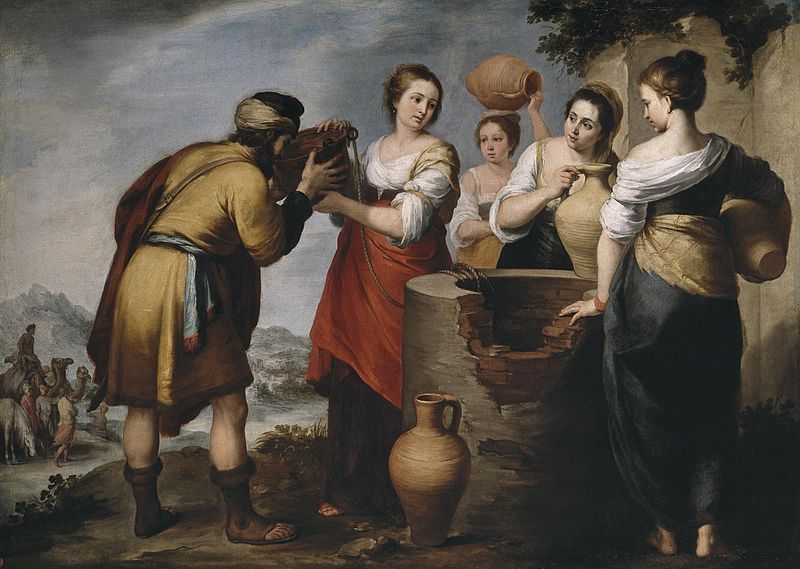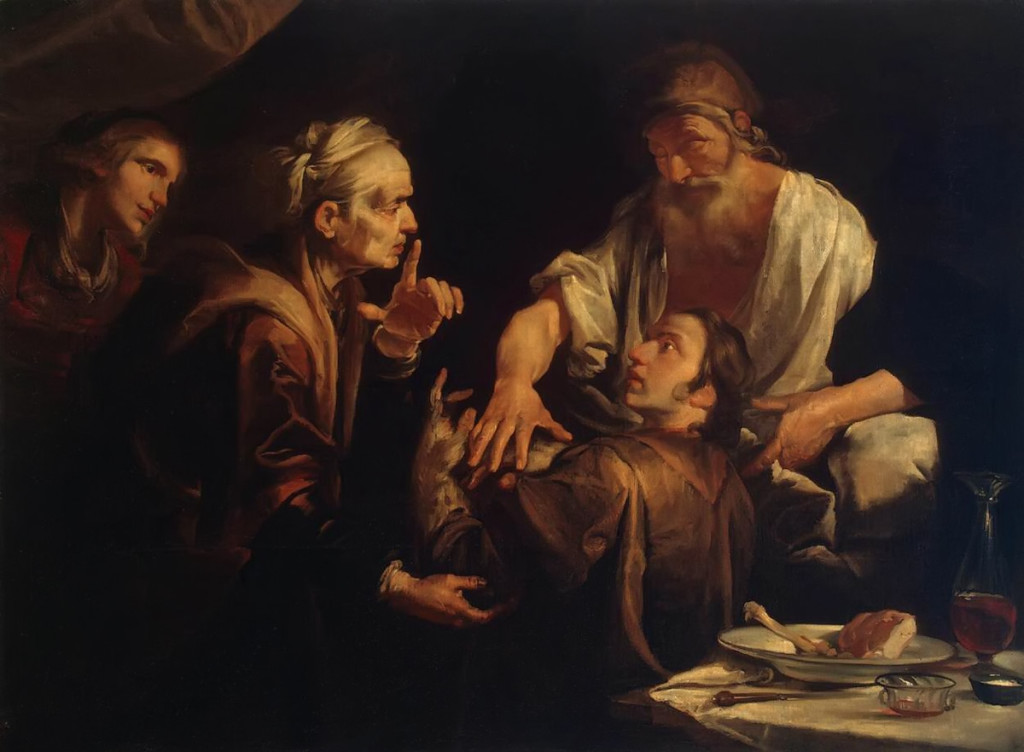Abraham as a flaneur. Walking, wandering, and catching a fleeting remark, a floating fragment of dialogue that would change his life and that of all history past, present and future. His dialogue with the almighty floating around in the imagination. On his way to find a wife for his son he picked up fragments of dialogue in the streets; after all, people in the streets talk freely to one another, with no idea they can be overheard. Hence, they will say the most absurd and memorable things, passing by, Abraham picked up the meaningless and meaningful.
But Abraham was not a flaneur in the sense of Charles Baudelaire’s elderly cruiser adapting to the new urban environment and the metropolitan carnal services that came into being. He and Sarah were the only monogamous marriage of the patriarchs and its message of hope and connection differed markedly with the romanticized France of the enlightenment. Sarah passed away, and her son needed a wife.

—Isaac’s servant trying the bracelet on Rebecca’s arm (painting circa 1800 by Benjamin West)—WIKI
So, Abraham purchases a plot of land in the land of Canaan to serve as an appropriate burial place for Sarah, at the much contested city of Hebron. Abraham began the quest for suitable spouse by sending a servant back to his birthplace with the instruction that the mystery lady is not to be a Cannanite. It helped that the groom’s family
was wealthy. But was Abraham hearing voices, flying splinters, acting of tidbits of scraps, falling remarks and acts of phrase grabbing stitched together from sequences of broken messages….
What are the nature of the qualities that said servant should be peeled eyed for in bride: The servant prays and asks that the test of Isaac’s future wife be the way she treats others, aesthetic considerations aside. At the famous scene of the well, the girl, apparently just three years old, offers water to a stranger from her jug, as well as to all the camels. Rivka ends up bringing the servant back to her family tent and after hearing about Isaac Isaac, agrees to return to Canaan to meet him.

—Rebecca and Eliezer (painting circa 1652 by Bartolomé Esteban Murillo)—WIKI
…One of Homer’s immortal cliches is “winged words.” The biblical lessons from the Old Testament assuming the significance of phrases as winged words. They fly around like butterflies, snagged by the righteous as they pass and printed for immortality and eternity. Some of these butterflies may have a sting but the heroes and heroines pay no heed. Isaac comes out to the field in the evening, looking up, he spots Rivka on her camel. Rivka sees Isaac, and quite dramatically falls off her camel. First sparks. The couple is introduced. They mingle. They go to the deceased Sarah’s tent and the whole union is nailed down on the spot.
The family dynamics of Abraham, son, and daughter-in-law differ markedly from the New Testament of Jesus who in an alternative view of family values, or perhaps inadvertent fleeting remarks,said (in Matthew 10:34-37), “Think not that I am come to send peace on earth; I came not to send peace, but a sword. For I am come to set a man at variance against his father, and the daughter against her mother”; whether the moral model is open to interpretation or merely a plank in a much larger ideology hiding in the cloud of monotheism, it is consistent, and in three part harmony with Luke 14:26, when Jesus says “If any man come to me, and hate not his father, and mother, and wife, and children, and brethren, and sisters, yea, and his own life also, he cannot be my disciple.”
…Rashi, the Jewish sage taught that when Rivkah crossed the threshold into Sarah’s tent, all those miracles that had arose during Sarah’s life began anew. A new beginning. A new Canaan. and monotheism marched on. “ a Shabbat candle burned from one week to the next, a blessing was in the dough, and a cloud (of divine protection) was attached to the tent.” It was a life continuing on because of legacy in the case of Sarah, a claim to the land of Israel promised by g-d, and Isaac finding a wife in the same mold.
Sarah’s legacy is that the previous generations, the dear, the loved and the lost continue to be with; the teachings, the value and the love are eternal and are transmitted from generation to generation, in a sharing of history,millions and millions of stories are interwoven and connected in a cosmic narrative, one without theological compensation for disaster and absent the eternal punishment and exclusion for those falling outside the pale of the one true way; and as Isaiah said, the splitting off of sin from solemn ceremonies.







 COMMENTS
COMMENTS